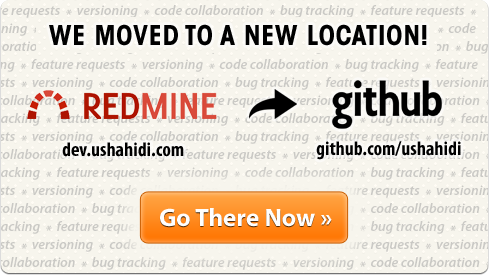Github Issues is the new official home for all technical issues/ticketing at Ushahidi. The previously announced migration to Github from the now retired RedMine is complete.
 This change was driven by community input requesting us to be more transparent and open in our software development. We’ve also made some changes to help you know the status and priority of an issue. As we’ve often been asked to make it easier to jump in and contribute, we’ve created a “community task” label. This is part of our ongoing changes to meet the community feedback and improve.
This change was driven by community input requesting us to be more transparent and open in our software development. We’ve also made some changes to help you know the status and priority of an issue. As we’ve often been asked to make it easier to jump in and contribute, we’ve created a “community task” label. This is part of our ongoing changes to meet the community feedback and improve.
 This change was driven by community input requesting us to be more transparent and open in our software development. We’ve also made some changes to help you know the status and priority of an issue. As we’ve often been asked to make it easier to jump in and contribute, we’ve created a “community task” label. This is part of our ongoing changes to meet the community feedback and improve.
This change was driven by community input requesting us to be more transparent and open in our software development. We’ve also made some changes to help you know the status and priority of an issue. As we’ve often been asked to make it easier to jump in and contribute, we’ve created a “community task” label. This is part of our ongoing changes to meet the community feedback and improve.
How to add a Github Issue:
Each Public Repository (Ushahidi_web, Ushahidi_Android, Ushahidi_iPhone, etc) has it’s own Issues section. To submit an issue, you must have a Github account. Setting up a Github account is fairly simple. If you are a developer, see these instructions. Even if you are not a developer, like me, you can simply set-up a basic account to submit tested bugs. Once your account is all set up, simply navigate to the Issues section of the Ushahidi project you’d like to file the bug report/feature request under, click on New Issue and fill out all the details. We highly recommend that you search the forums and ask on the mailing lists/skype first before submitting an issue. If you discover a high risk security bug (thank you), please send these with priority to the team rather than posting to Github Issues.How the tickets are organized:
We’ve organized the tickets with coloured labels: Type: Bug, Feature, Community Task Priority (P): P1 (Immediate), P2 (Normal) and P3 (low).How to Help (Community Task)
The labels are pretty self-explanatory but we want to highlight the "Community Task" label. We added that in the mix as an easy way to indicate to community dev's where they dive in. Of course folks can pitch in anywhere but for someone who's new, a "Community Task" is something that is deemed low-hanging and a good place to get one's feet wet.How will tickets be handled
Each week we are committed to issue review. And, of course, following up on the actions accordingly.Getting Help:
On Technical Issues:
- Search the wiki or forums.
- Collaborate with the community skype or dev mailing list. (This is a real-time stream of global chatter)
- Search Github Issues for existing issues.
- Add a Github Issue: (bug or feature) request.
On Non-Technical Issues:
- Search the wiki or forums.
- Add a forum post for questions.
- Share your knowledge on the wiki.
- Collaborate with the Channel for Academics, Researchers and Community Skype Chat or mailing lists.
- To ask general non-technical tickets, you can drop us a Contact note.